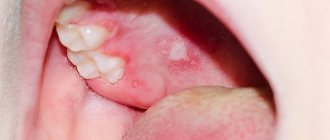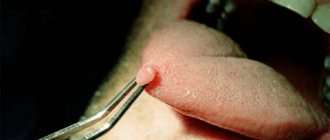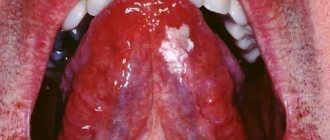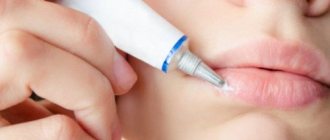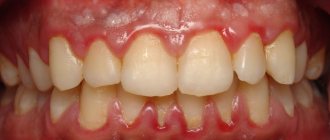Almost everyone is familiar with a “cold” on the lips. As soon as you catch a runny nose or get nervous, an unpleasant harbinger immediately appears - a tingling sensation somewhere around the mouth.
The herpes simplex virus is present in the body of 95% of people. And only a few have immunity, the reasons for which are still unclear.
The virus enters the body in early childhood: at 3–4 years, when the antibodies against the herpes virus transmitted to the baby by the mother are depleted. Most often, infection occurs if a child is kissed by carriers of the infection. In addition to a kiss, the virus can enter the body, for example, with saliva. It penetrates the mucous membranes, reaches the nerve endings, rises into the cranial cavity, where it “hides” in a nerve plexus called the trigeminal ganglion and “sleeps” there until it is reactivated.
Herpes “wakes up” when immunity decreases
Causes of recurrence of herpes on the lips: stress or emotional distress; various other diseases, in particular colds, flu, diabetes, HIV; poisoning or intoxication; drinking alcohol, caffeine and smoking; excessive ultraviolet radiation; hypothermia or overheating; onset of menstruation; overwork and exhaustion; poor nutrition/diet or stomach upset; other factors individual to each person.
After “awakening,” the virus travels back to the skin. As the virus moves through a nerve, it causes inflammation of the nerve tissue.
The development of herpes can be divided into several stages. At the first stage, the person feels unwell. At the site where the “fever” appears, there is pain, tingling, and the skin turns red. At the inflammation stage, a small painful blister filled with fluid forms. After some time, the bubble bursts and a colorless liquid containing billions of viral particles flows out of it. An ulcer appears in its place. At the final stage, the ulcer becomes covered with a crust.
Most often, herpes appears on the lips, but lesions can also appear on the face, in the ears or in the mouth.
How does herpes develop?
Herpes has several stages of development:
- at the first stage, unpleasant sensations appear in the lip area, already at this time it is necessary to begin treatment of herpes in order to prevent the transition to the next stage;
- at the second stage, inflammation of the mucous membrane appears, small blisters may appear;
- at the third stage, the blisters enlarge and may burst, leaving small ulcers in their place;
- The fourth stage is characterized by the appearance of scabs at the site of ulcers, which disappear upon healing.
It is important to monitor your body, and if other symptoms appear and your condition worsens, contact the clinic for competent help.
What to do if you have a “cold” on your lips
At the moment, no drugs or treatment methods have been developed that would completely destroy the herpes simplex virus in the human body. But we can give some advice to those suffering from herpes.
- Strictly follow the rules of personal hygiene! Since herpes is contagious, it is necessary to wash your hands with soap and use separate utensils and towels.
- Don't put your hands near your eyes! And do not wet your lenses with saliva! Herpes can affect the mucous membrane of the eye.
- It is not recommended to touch the viral rash or kiss. The virus can be transmitted by wearing one lipstick or smoking one cigarette.
- If you try to remove a blister or scab over a sore, the virus can spread to other parts of the body.
- Avoid oral sex! The virus from the affected lips can cause genital herpes in a partner.
- A young mother must also take certain precautions to protect her baby from contracting herpes. If you have herpetic rashes, you must wash your hands with soap and water every time before touching your child. And under no circumstances should the affected surface come into contact with the child’s skin.
Treatment of herpes
If you have herpes, it is not necessary to immediately contact an immunologist, because the manifestation of this disease up to 4 times a year is considered normal. If the disease bothers you more often, then contacting a specialist is necessary.
To get rid of herpes, drug treatment is most often used. Antiviral ointments are used, which are sold at any pharmacy, and immunostimulating drugs can also be used.
If the necessary medications are not available when symptoms of herpes appear, then you can use folk remedies: garlic, toothpaste or fir oil. Use garlic internally, as it is considered a good antiviral agent, and smear the area of inflammation with either toothpaste or fir oil. Our patients note in their reviews that folk remedies sometimes help to cope with a sore faster than proven medications.
Remember the most important thing: if herpes begins to bother you more than 4 times during the year, contact a specialist.
How to minimize discomfort
You should start using antiherpes medications as soon as you feel a tingling sensation. Medicines will not get rid of the virus, but they will stop its development and speed up recovery. There are drugs that prevent the development of the virus: tablets, ointments for external use, which help heal blisters and ulcers and reduce discomfort.
When applying the ointment, use cotton swabs to avoid transferring the virus from your lips to the skin of your fingers.
Herpes requires the attention of specialists! A “cold” on the lips can be a symptom of serious diseases: a sharp decrease in immunity, cancer, HIV infection.
If you are suffering from relapses of herpes, consult a doctor. A specialist will not only save you from unnecessary worries and eliminate health hazards, but will also help you choose a comprehensive program for the prevention and treatment of herpes.
In order to make an appointment with an immunologist or dermatologist for a program for the diagnosis and treatment of herpes, call the Family Doctor clinic (clinic hours: Mon-Fri from 8.00 to 21.00, Sat-Sun from 9.00 to 20.00), or sign up for reception and diagnostics via online registration form
What is herpes and how to treat it
The herpes virus lives in the body of every person, and everyone has individual characteristics.
As soon as the immune system weakens or a person gets hypothermia, a “cold” appears on the lips - in other words, herpes. This disease can and should be treated; the best doctors work for this at the Stolitsa clinic, who give consultations every day and help many city residents cope with this problem at a very reasonable price. This disease is familiar to everyone, but, unfortunately, not many people know how to treat herpes on the lips, as well as the fact that frequent colds on the lips can indicate more serious problems in the body, for the diagnosis of which it is necessary to contact a medical center.
Herpes - prevention and treatment
15.Nov.2021
People with immunodeficiency may experience generalized forms of infection involving other organs and tissues. Among the eight types of herpes known to science, the most common is the herpes simplex virus. The herpes simplex virus is quite unstable in the external environment. At room temperature it lasts up to 24 hours, on metal - up to 2 hours. When exposed to temperatures above 50°C, it dies within 30 minutes, under the influence of alcohol and chlorine-containing substances - within a few minutes, and when frozen it persists for up to five days.
The source of infection is always a person. It is contagious during any phase of the disease or carriage, but mainly during exacerbation. The pathogen can be transmitted by airborne droplets, household contact or sexual contact, as well as from mother to fetus through the placenta, during childbirth or breastfeeding. All people are susceptible to the virus, although many have asymptomatic forms of the disease. Entering the human body through the mucous membrane of the mouth, genitals or respiratory tract, the herpes infection remains in it forever. The virus, hidden inside the host cell, is not accessible to immune cells that destroy pathogens. The virus is activated when the immune system is weakened as a result of hypothermia, overheating, colds, lack of vitamins, overwork, stress, lack of sleep. Recurrence of infection can be caused by injuries, surgical interventions, as well as sexual contact if the mucous membrane is damaged. The use of medications and cosmetics containing steroid hormones also contributes to the manifestation of the herpes virus.
Herpes can change a person’s life, sometimes slightly, and sometimes dramatically. Currently, diagnostic capabilities are expanding, and effective methods for treating this disease have been developed. Globally, an estimated 3.7 billion people under the age of 50 (67% of the population) are infected with HSV-1. It is estimated that approximately 417 million people aged 15 to 49 years (11%) are infected with the HSV-2 virus worldwide.
Science now knows more than 100 herpes viruses, but the causative agents of the disease are the following:
• herpes simplex virus type 1 causes herpes labialis, that is, herpes on the lips (HSV-1); • herpes simplex virus type 2 is the cause of genital herpes (HSV-2); • shingles or chickenpox virus (Herpes zoster); • cytomegalovirus (CMV); • Epstein-Barr virus (EBV).
The latent state of the virus can persist throughout life. The interferon link of the immune system is responsible for the manifestation of the disease, i.e. the intensity of the manifestation of herpetic infection depends on its condition. The mildest manifestations are barely noticeable blisters on the skin, but herpes can also manifest as severe damage to the nervous system. HSV (herpes simplex virus) can infect any organ. It is characterized by a chronic course and various forms of clinical manifestation. The herpes simplex virus affects the central nervous system and causes encephalitis, encephalomyelitis, and myelitis. When affecting the eyes, herpes causes uveitis, keratoconjunctivitis and keratitis. In the liver, the herpes virus can cause hepatitis in newborns and adults. Herpes also affects mucous membranes and skin. This is the most common manifestation.
The herpes simplex virus spreads through airborne droplets, sexual contact, contact, transfusion, and also through organ transplantation. A pregnant woman can transmit the virus to her fetus through the placenta or while the fetus is passing through the birth canal. Pregnant women with symptoms of genital herpes should inform their doctors. Preventing new cases of genital herpes virus infection is especially important in late pregnancy, since during this period the risk of developing neonatal herpes is greatest. The herpes virus enters the human nervous system through nerve endings. It multiplies in nerve cells and enters a latent stage. In the last phase, the virus manifests itself through its replication and migration along nerve cells to the site of herpetic manifestation, rash. Herpes can be activated as a result of mental and physical overload, hypothermia, taking corticosteroid hormones, menstruation, mechanical damage or friction of the skin, or previous colds.
• The manifestation of genital herpes occurs by the appearance of redness and burning of the skin, rashes of single or grouped painful blisters on the external or internal genital organs. • The blisters are uncomfortable, but after some time they crust over and heal. • The first symptoms of herpes are usually accompanied by high fever, general malaise and headache. • Isolation of viruses from infected tissues occurs within 10-12 days. • Herpes becomes recurrent in approximately 30-50% of people infected with the infection. However, the timing of recurrence may vary, but usually it is up to 6 months.
The most effective medications for people infected with HSV are antiviral drugs such as acyclovir, famciclovir and valacyclovir. They help reduce the severity and frequency of symptoms; however, they do not cure the infection. Complications of herpes can cause very bad consequences. First of all, this is intrauterine infection of the fetus. Herpes in the cervix can cause infertility. There are also cases of the development of herpes viruses in the nervous structures of the pelvis, which lead to persistent pain syndromes.
Several rules that must be followed if you have herpes rashes: Since herpes rashes are very contagious, try not to touch them too much, or if you do touch them, for example, by applying medicinal ointment to them, then immediately Wash your hands thoroughly with soap to avoid spreading the herpes virus to other areas of the skin.
• Accordingly, do not try to “pick off” the bubbles or the resulting crust with your hands, otherwise there is a risk of spreading this infection even further. • To avoid the herpes virus affecting the eye area, be careful when applying makeup. It is advisable to avoid eye makeup altogether during the period when herpes appears on the lips, but if this is not at all acceptable for you, make sure that your hands are well washed and that your brushes and other makeup accessories are disinfected. And most importantly, under no circumstances touch the mucous membrane of the eyes with anything. Well, if you use contact lenses, naturally do not wet them with your saliva. • To avoid infecting your family members or other people with the herpes virus, use only separate containers for eating and drinking that only you will use. The same applies to towels, toothbrushes, cosmetics and other things that, as described above, can interact with touching the resulting cold on the lips. After the cold sore on the lips goes away, it is recommended to thoroughly disinfect all these accessories, or, even better, replace them with new ones. • Try not to expose areas affected by herpes to the sun, this can further spread the infection and also increase the itching and burning sensations.
BU "Surgut City Clinical Clinic No. 3"
Symptoms of herpes
The clinical picture of the disease depends on the type of pathogen and the location of the affected area. Infection with all strains of herpesvirus is characterized by redness of the skin or mucous membranes and the appearance of blisters. Pain and burning may be felt in the inflamed area. But you can’t puncture the blisters, as this will worsen the course of the disease.
After two or three days, the bubbles begin to burst. In their place, ulcers form. The affected area on the lips is covered with a crust, and on the mucous membranes it is filled with fibrinous tissue. If antiviral treatment is not carried out, the disease will reappear when immunity decreases.
Often, when the disease occurs, the body temperature rises to 37–38 degrees. Therefore, in everyday life it is often called a cold. But herpesvirus is not the cause of acute respiratory diseases. Treatment of labial herpes with cold remedies is ineffective. It is necessary to determine the type of herpes virus and undergo a treatment regimen prescribed by a doctor.
Herpes lips
Infection with herpesvirus type 1 often results in blisters on one or both lips. A day before their formation, the patient may feel general weakness. The bubbles burst on their own on the second or third day. Instead, a crust appears that cannot be peeled off. It disappears on its own after seven or ten days.
In the eye area
The herpes virus can cause inflammation of one or both eyes, as well as the eyelids. Touching this area with unwashed hands often causes damage to this area. Symptoms of the disease are:
- pain or stinging in the eyes;
- increased photosensitivity;
- redness of the mucous membranes;
- formation of blisters on the eyelids.
Advanced herpes in this case is dangerous. Complications of the disease can cause complete loss of vision and the formation of scars on the eyelids. When the first symptoms of eye damage appear, you should immediately consult a doctor.
Herpes face
Lesions may occur on the forehead, chin, both cheeks, the back and tip of the nose, and on the ears. Often the affected area appears where there have already been microtraumas on the skin.
In the oral cavity
Inflammation of the mucous membranes of the oral cavity is called “herpetic stomatitis”. This disease in children is accompanied by gingivitis (inflammation of the gums). When the bubbles with liquid burst, erosions are formed, covered with a whitish coating. Redness is observed around the erosion zone. A person experiences pain while eating and brushing his teeth.
Genital herpes
The disease affects the pubis, buttocks, genitals and anus. Clusters of bubbles with liquid inside appear on the skin. The area around them turns red, pain, itching, and irritation appear. Genital herpes is transmitted through barrier-free sexual intercourse. The cause of infection can be touching the groin area with unwashed hands.
Acyclovir - instructions for use
When treating stomatitis caused by the herbes virus, it is customary to use acyclovir tablets, since creams and ointments are not able to have the desired effect due to the impossibility of fixing fat-based medications in the oral cavity. Therefore, such compositions are recommended for use when infection spreads in the skin tissues.
The course of the disease in severe form often requires the administration of drug solutions intravenously.
Acyclovir tablets
The course of taking tablets is from five to ten days, during which the drug is taken 4-5 times a day. For both adult patients and children starting from two years of age, the dosage of the drug is 200 mg at a time, and for children under two years of age the dose is halved, which is 100 mg.
Diseases that occur in severe forms often require an increase in dosage and therefore the drug can be prescribed in an amount of 400 mg per dose.
It should be taken into account that tablets should be taken during the daytime, which allows the drug not to settle in the kidneys and not cause side effects in the genitourinary system of the body. In addition, it is recommended to increase the volume of fluid consumed by the patient, which helps reduce the concentration of acyclovir in the urine and prevent the development of kidney disorders.
Treatment of the so-called “chickenpox” with drugs containing acyclovir is not recommended for children, since their age allows them to tolerate this disease in a milder form than adults.
Powder forms of acyclovir
Compositions for administering the drug through a dropper are prepared on the basis of physiological solution, for which bottles containing a certain amount of the drug are filled with liquid, according to the instructions, shaken thoroughly until the suspended particles are completely dissolved, and the finished solution is poured into containers for drip infusions.
Before the first use of the composition, it is necessary to test the tolerability of the drug, which allows you to avoid allergic reactions of the body when using it. The test involves applying the drug to a shallow scratch made with a needle on the inside of the forearm and observing for several minutes. If an area of inflammation forms around the damaged surface, the use of acyclovir should be avoided.
Drip administration of the drug is justified by the fact that the content of the drug in the patient’s blood should increase gradually, since otherwise this procedure can provoke complications. Therefore, one-time procedures are carried out within an hour, and sometimes longer.
Acyclovir ointment - instructions for use
Acyclovir ointment, the use of which is recommended for the local treatment of ailments caused by the herbes virus, is offered in tubes of 2, 5 or 10 g, the content of the active substance in these compositions is exactly 5%, which makes it possible to use the drug in the initial phase of the disease. Thus, products in the form of ointments and creams are recommended to be used at the first signs of the disease:
· when itching occurs;
· minor pain.
The procedures should be continued for 5-10 days, applying the composition to the skin, without rubbing the product, into the damaged area.
Acyclovir helps reduce the intensity of skin lesions, promoting rapid healing and crust formation. However, the crusts that form when using the drug should not be removed independently, since such an initiative significantly reduces the effectiveness of treatment and provokes infection of others with the herbes virus.
In addition, the use of the drug for medicinal purposes does not prevent the spread of the disease through sexual contact.
Eye ointment containing acyclovir
Such products are commercially produced in small tubes containing up to five grams of the drug, with an acyclovir concentration of 3%.
The use of the composition involves placing the product behind the lower eyelid, a thin strip up to one centimeter long, which helps the composition spread across the cornea and absorption into the surrounding tissues.
It is recommended to use the drug up to 5 times a day, for 5-10 days, however, if signs of intolerance occur, you must see a specialist and change the medicine.
Cost of drugs
Drugs in various forms are produced by both domestic and foreign pharmaceutical companies, therefore the choice of products that include acyclovir is quite diverse. In addition, the cost of these antiviral agents is affordable.
Thus, acyclovir in tablets, the price of which from domestic manufacturers does not exceed 250 rubles, allows people of any income to purchase and use an effective remedy.
Drugs produced in the form of ointments and creams are also not very expensive, which makes it possible to successfully cope with the disease in its initial stages without resorting to hospital treatment.
Powder forms of acyclovir, used for drip administration by professional medical workers, are produced mainly abroad, which affects the cost, but their use helps to cure severe viral infections.
Local antiviral herbal remedies
Ammonium glycyrrhizinate
The active component of the drug, activated glycyrrhizic acid, is obtained from licorice root. It has a complex immunostimulating, antiviral, anti-inflammatory, antipruritic effect. Glycyrrhizic acid interrupts the replication of a number of DNA and RNA viruses, including herpes simplex virus, human papillomavirus, and cytomegalovirus [5].
Indicated as a drug for the treatment of human papillomavirus infection and herpes simplex virus, including infection with oncogenic viruses. Available in the form of a spray, which is sprayed onto the mucous membranes and affected areas of the skin.
Vacation: without prescription.
+
It has a wide range of indications, including the prevention and treatment of vulvovaginal candidiasis, discomfort in the genital area. Can be used during pregnancy and breastfeeding; well tolerated.
Podophyllotoxin
The active component of podophyllin, a derivative of plant extracts isolated from the rhizomes with roots of Podophyllum thyroid - a plant of the barberry family. It has pronounced antitumor and antiviral properties and has a cytotoxic effect. When used externally, it cauterizes and mummifies condylomas. It is used as a drug for local treatment of human papillomavirus. Available in the form of a solution for the treatment of genital warts [8].
Release: by prescription.
+
Proven effect. According to research, a 0.5% solution of podophyllotoxin reduces the number of anogenital warts from 6.3 to 1.1, destroying about 70% of formations [8].
!
Care must be taken when using - contact with healthy skin can lead to ulceration. Local reactions during use, allergic reactions. The physician, when dispensing this antiviral drug for papillomas and condylomas, must draw the client’s attention to this feature and remind him that the drug should be stored out of the reach of children.
Tetrahydroxyglucopyranosylxanthene
Russian drug. The active component is isolated from the Alpine kopek plant or the yellow kopek plant.
According to the instructions, it has antiviral activity against HSV-1 and HSV-2, as well as cytomegalovirus and some other DNA-containing viruses. In addition, the drug presumably activates cellular and humoral immunity, inhibits the growth of a number of bacteria and pathogenic protozoa, including Trichomonas, and also has a moderate anti-inflammatory effect. Used in the form of an ointment as part of the combined treatment of acute and recurrent forms of herpes, including genital herpes [5].
Vacation: without prescription.
+
Favorable safety profile, the ability to be used as part of complex treatment.
Polysaccharides of Solanum tuberosum shoots
A Russian prescription drug, the active component is obtained from the shoots of tuberous nightshade. According to the instructions, it exhibits an antiviral effect against HSV-1 and HSV-2, promotes the induction of interferons and increases the immune response [5]. It should be noted that the pharmacokinetic properties of the drug have not been studied. Vaginal suppositories are used in complex therapy of genital herpes.
Vacation: without prescription.
+
High safety profile. Side effects are rare.
Desmodium canada herb extract
An antiviral drug for herpes of plant origin, created from a dry extract of the herb Desmodium canadensis. According to the instructions, it exhibits antiviral activity against herpes viruses and stimulates the production of interferon [5]. The ointment is indicated for use in acute and recurrent forms of herpes, including urogenital.
Vacation: without prescription.
+
High safety profile - no side effects identified.
Hyporamine extract
Russian development based on sea buckthorn leaf extract. According to the instructions, it is active against herpes simplex viruses, cytomegaloviruses and some others [5]. An ointment containing hyporamin extract is indicated for the treatment and prevention of episodes of herpes, including genital herpes.
Vacation: without prescription.
+
High safety profile; Possibility of use during pregnancy and lactation (after consultation with a doctor).




